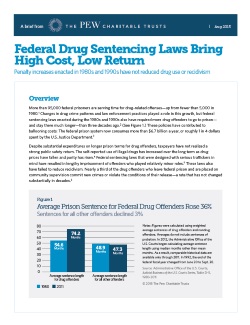A recent report by the Pew Charitable Trusts provides new evidence suggesting that the increased incarceration rates over the last three decades for drug offenses have done little to reduce crime and recidivism.
The study, “Federal Drug Sentencing Laws Bring High Cost, Low Return,” examines the effects of “tough on crime” legislation passed in the 1980s and 1990s. The findings are less than supportive of such an approach.
“Despite substantial expenditures on longer prison terms for drug offenders, taxpayers have not realized a strong public safety return,” the report says. “The self-reported use of illegal drugs has increased over the long term as drug prices have fallen and purity has risen.”
The results of these policies on recidivism rates are similarly unflattering. “Nearly a third of the drug offenders who leave federal prison and are placed on community supervision commit new crimes or violate the conditions of their release—a rate that has not changed substantially in decades.”
Mandatory minimum laws and “three strikes” legislation have caused prison populations to skyrocket. From less than 5,000 federal prisoners with drug-related convictions in 1980, federal prisons are now home to over 95,000 such prisoners. The percentage of drug offenders in federal prisons has gone from 25 percent to nearly 50 percent in that time span. And the average sentence for drug-related crimes has increased 36 percent, even as other sentences have declined.
The report does end on a somewhat positive note, pointing out recent efforts to reduce criminal penalties for some drug offenders have reduced prison numbers and prison-related expenses without an increase in crime. However, it will take some time to reverse three decades of policies focused primarily on incarceration.
Creating a more effective drug policy requires as much a change in perspective as it does a change in policy. More than just being “tough on crime,” a solid strategy requires being “smart on crime”—working to rehabilitate and restore in order to reduce recidivism in a way that is moral, fiscally responsible, and effective. To learn more about what can be done to make drug-related policies more effective, visit www.prisonfellowship.org.
